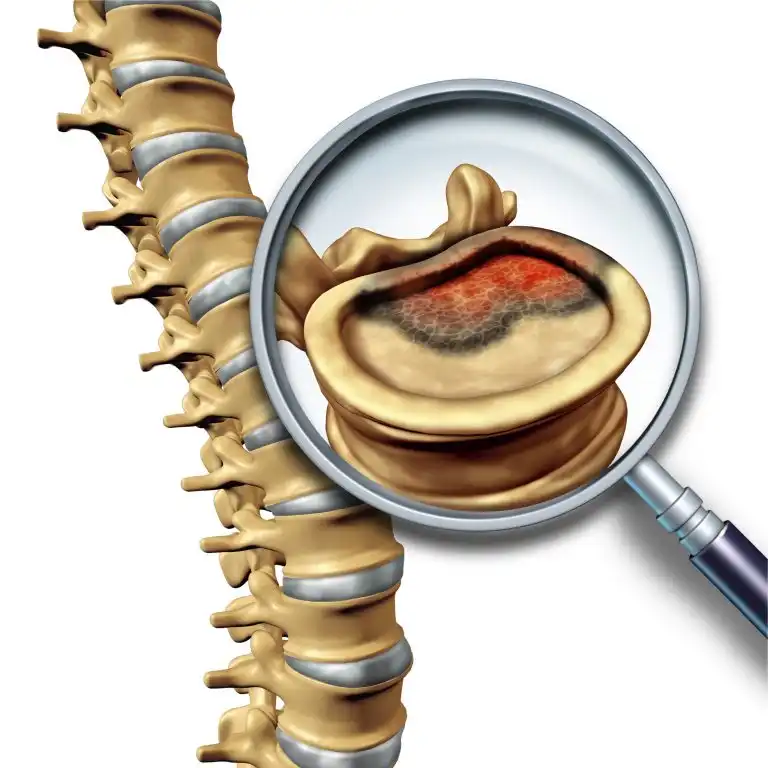Home » Medical Procedure » Spine Cancer Surgery
Spine Cancer Treatment &
Surgery in India
Understanding
Spine Cancer
The formation of a malignant (cancerous) tumor by abnormal cell proliferation in the tissues that make up the spine, such as the spinal canal and vertebrae, is known as spinal cancer. Spine tumors can take many different forms.
Primary tumors start in the spine, including the bones, nerves, and other tissues. Both high-grade and low-grade tumors that spread swiftly or slowly can be present in spinal cancer. Most spine tumors are metastatic or cancer that has spread and affected the spine coming from another region of the body. The most common causes of metastatic spinal cancer are lung, breast, and prostate.
Because of the way that metastatic cancer spreads throughout the body, it is more dangerous than primary spinal cord tumor. Any portion of the spine, including the neck, the sacrum (the bone at the base), and the hip bones, can develop spinal cancer, which can be treated with spine cancer surgery.

Renowned Spine Cancer Surgeons
at Wockhardt Hospitals
- Mumbai Central
- Mira Road
- Nagpur
- Rajkot
Signs & Symptoms of Spine Cancer
Different spine cancer symptoms may appear depending on the type and location of thespinal cord tumor. Some symptoms could develop gradually. Other times, they could appear out of nowhere and advance swiftly. These signs could consist of, but not be limited to :
- Back or neck pain
- Leg or arm pain
- Sexual dysfunctionality
- Fatigue
- Paralysis
- Spinal deformities
- Loss of bowel or bladder function
- Muscle weakness
- Difficulty in standing
- Numbness in extremities
What Are the Main Causes
of Spine Cancer?
The potential cause of the cancer is still unknown. Some cancer metastases can be prevented even before they reach the spine. For example, lung cancer can be reduced by not smoking. Liver cancer can be reduced by reducing alcohol. Common risk factors for developing spinal cancer are as follows :
- Compromised Immune System
According to the American Association of Neurological Surgeons, spinal cancer affects the immune cells. This is more common in people with compromised immune systems.
- Radiation Exposure
Spinal cancer may develop in individuals exposed to radiation or carcinogenic industrial chemicals.
- Family History
Family medical history can also be a risk factor for spinal cancer in some.
What Are the Different Types
of Spine Cancer?
There are many types of spine cancer. However, we have discussed two types of cancer in brief :
Benign Spinal Cancer
A benign spinal tumor is not cancerous and will not spread to other body parts. They usually include neurofibromas, schwannomas, meningiomas, astrocytomas, ependymomas, osteosarcomas, hemangioblastomas, giant cell tumors of the bone, and osteoid osteomas. Although some are incidental findings, some cause local pains, radicular symptoms, spinal instability, deformity, and neurological compromise.
Primary Spinal Cancer
Primary spinal cord tumor refer to those that start in the spine. They make up a minor portion of spinal tumors, are generally benign or non-cancerous, and are uncommon. Malignant tumors can also develop in the spine and frequently spread there from another part of the body.
Metastatic Spinal Cancer
It is a cancer of the spine that has not developed in the spine but came from another body part.
Is it possible to be completely cured of Spine Cancer?
Spine cancer was once thought to be a terminal disease. However, current research indicates that some patients with only a few spinal metastases may be able to recover with aggressive therapy, such as surgical excision or stereotactic radiosurgery. Though it is not completely curable, it can be controlled with fractionated radiation, chemotherapy, stereotactic radiosurgery, etc.
The treatment aims to stop or slow down the spinal metastases growth in the spine. It also prevents any further expansion of the tumor. The treatments are provided until cancer halts or gets completely treated, which offers a better quality of life by keeping the tumor controlled and contained. For the best spine cancer treatment in India, visit Wockhardt Hospitals. We have a wide range of new technologies to help you get back to your normal life. Our team of highly experienced medical surgeons and oncologists will help you with diagnosing and treating the condition efficiently.
Common Tests Required to
Diagnose Spine Cancer Surgery
If you experience any of the symptoms mentioned above, visit a doctor immediately. At Wockhardt Hospitals, our team of experts will diagnose your condition and ask you for some tests to evaluate it before finalizing the surgery. The tests required to diagnose spine cancer surgery are mentioned below –
-
Spinal Magnetic Resonance Imaging (MRI)
MRI uses strong magnetic fields and radio waves to produce correct images of your spine, spinal cord, and nerves. This is the most common test performed to diagnose spinal tumors. During the evaluation, a contrast agent may be injected into a vein in your hand or forearm to help highlight specific tissues and structures.
-
Computerized Tomography Scan
CT scan uses a narrow beam of radiation to produce detailed images of your spine. Sometimes, it is combined with an injected contrast dye to make abnormal changes in the spinal cord, making it easier to see. However, this is rarely used in spinal cord diagnosis.
-
Biopsy
Biopsy determines the type of cancer in the spine. A small tissue sample is examined under a microscope, determining the treatment options.
-
CBCs (Complete Blood Tests)
Sometimes, if doctors deem it necessary, you will be asked for blood tests for a better diagnosis.
What Are the Treatments Performed
to Cure Spine Cancer?
Treatments for spinal surgery vary depending on the type, stage, and location of the cancer. Some of the common treatments for spinal cancer are as follows :
-
Surgery
Spine surgery procedure is often the most common treatment for tumors that can remove them without harming the nerves and the surrounding area. The introduction of high-powered microscopes and other technologies allows neurosurgeons to identify and remove tumors efficiently. Also, high-frequency sound waves may break down the tumors and remove the fragments with surgery.
However, even with the most advanced technology, all the tumors cannot be removed. Some fragments are left behind, which require further procedures. The recovery from the surgery may take weeks or longer, depending on the procedure. You might also lose sensation temporarily.
-
Radiation Therapy
Radiation therapy is a part of the treatment plan and is usually used with surgery or chemotherapy. After the surgery, radiation therapy removes the remnants of tumors. It can also be used to treat inoperable tumors along with areas where the surgery is too risky. The most popular type of radiation therapy is external radiation therapy, which targets the tumor and the surrounding area. For metastases, sometimes radiation is administered to the entire spine. SRS (Stereotactic Radiosurgery) is used in small spine tumors. It minimizes exposure to the rest of the spinal cord. You might experience side effects such as nausea and vomiting, which can be treated with certain medications.
-
Chemotherapy
Chemotherapy is used when a tumor cannot be safely removed by surgery. It uses medication to destroy cancer cells or to stop them from growing. It has been used for ages to treat many forms of cancer. Chemotherapy drugs are usually administered into the veins or are asked to take orally. However, the drug is directly injected into the cerebrospinal fluid for some spinal tumors.
Other Treatments Options
Surgery and radiation therapy might cause inflammation in the spinal cord. This might cause pain and swelling. To deal with the inflammation, your doctors might provide you with a corticosteroid after the surgery or radiation therapy. This helps with muscle weakness, high blood pressure, and a weakened immune system.
Also, if the spinal cancer is caused due to myeloma, autologous stem cell transplants can be a treatment option, combined with chemotherapy. It involves extracting your own stem cells from your bone marrow or peripheral blood before the transplant and storing the cells safely. After the extraction, chemo drugs are administered to destroy multiple myeloma cells. The extracted cells are then placed back into your body through the vein.
How to Take Care of Your Body
After Spine Cancer Treatment?
Knowing about your spinal condition can be overwhelming, and going through the surgery for spine cancer treatment can be overwhelming too.
Spine cancer treatment is a complex and long procedure – your body and mind get exhausted, and you must take time off from everything to take care of yourself and heal properly.
There is no one care plan, but you must take some precautions after the treatment, as given by the doctor. Some of them are –
- Avoid heavy lifting for 4-8 weeks.
- Therapy is advised sometime after the surgery to cope with the exhausting procedure.
- Avoid twisting or bending.
- Do not engage in any physical activity after the surgery.
What Are the
Risks Factors For Spine Cancer?
Some of the risk factors for spine cancer are as follows :
-
Neurofibromatosis 2
Benign tumors grow on or close to the nerves that control hearing in neurofibromatosis type 2. One or both ears may experience progressive hearing loss due to this. A person having Neurofibromatosis 2 can also get tumors in their spinal canals.
-
Von Hippel-Lindau Disease
This rare multisystem disorder is associated with blood vessel tumors in the brain, retina, and spinal cord. It might also cause other types of kidney and adrenal gland tumors.
Some other risk factors are-
- Cancer History
- Family History of Spine Cancer or any other cancer
- Exposure to Radiation
- Compromised Immunity
Life Wins Stories
The vision and leadership of Wockhardt’s Founders have been instrumental in shaping the organisation’s ethos of providing high-quality and affordable healthcare services to patients worldwide. Read and listen to the heartfelt experiences of our patients as they share their stories about the exceptional care they received at Wockhardt Hospitals.



Paresh Vyas
Excellent facility with renowned Cardiologists like Dr Dharmesh R Solanki. Very humble doctors, and good staff. Value for money.

Meena Kothari
Excellent facility with renowned Cardiologists like Dr Dharmesh R Solanki. Very humble doctors, and good staff. Value for money.
Life Wins Stories

Paresh Vyas
Excellent facility with renowned Cardiologists like Dr Dharmesh R Solanki. Very humble doctors, and good staff. Value for money.

Meena Kothari
Excellent facility with renowned Cardiologists like Dr Dharmesh R Solanki. Very humble doctors, and good staff. Value for money.
Spine Cancer Blogs
FAQs on Spine Cancer Treatment
Q. Which hospitals specialize in spinal cord tumor treatment in India?
Wockhardt Hospitals is a leading choice for spinal cord tumor treatment in India. The hospital is equipped with advanced technology and experienced specialists, providing comprehensive care for patients dealing with spinal cord tumors. With a team of skilled neurosurgeons and state-of-the-art facilities, Wockhardt ensures personalized care and advanced treatments.
Q. Can spinal tumors cause paralysis?
Spinal tumors or any type of growth can cause pain, neurological issues, and sometimes paralysis.
Q. Are all spinal tumors cancerous?
An altered tissue mass inside or around the spinal cord, vertebral column, and sometimes both is referred to as a spinal tumor. Some spinal tumors are not malignant. Spinal tumors can be divided into two categories: benign or non-cancerous and malignant or cancerous. Benign tumors can pose risks to health, but they do not spread into neighboring tissues. Cancerous tumors have the potential to metastasize, spreading to another region in the body.


































